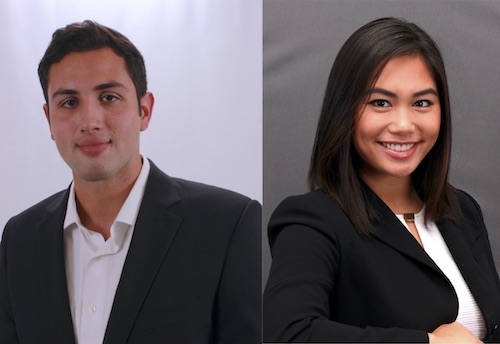#CapstoneChronicles
Category : #WeAreEmoryEPI
For the first installment of #CapstoneChronicles, I spoke with four of the five members of the Epidemiology Department’s inaugural capstone cohort about their experiences so far, early on in the project process. I will be checking in with them periodically over the next few weeks, profiling individuals and the class as a whole, so stay tuned to hear more about their perspectives as the project unfolds!
Student Profiles
AJ Montero is a 2nd year EPI MPH student who studied Microbiology at the University of Florida before coming to Rollins.
Phoenix Tran is a second year EPI MPH student who also studied Microbiology during her undergraduate degree at the University of Georgia.
Why did you decide to pursue a capstone over a thesis?
Phoenix: I did a thesis at the end of undergrad, so this time I wanted to have a more hands-on experience working with an organization and help them to solve problems.
AJ: I was applying for medical school this past summer and got delayed on the thesis process, and given the time constraints I decided it would not be realistic to continue down that road. Along with my other priorities, I thought I would be able to contribute more meaningfully to a collaborative process and that the capstone would be more fulfilling and beneficial for my long-term goals.
Can you briefly describe the organization you’re partnering with and how you get to use your epi skills and experience to benefit the organization through this project.
AJ: We are working with Resilient Georgia, which is a new organization seeking to integrate behavioral care for children in Georgia and create a safety net for people who typically fall through the cracks in social services. They want to use data on childhood trauma to see which adverse childhood experiences are associated with adverse outcomes later in life to inform future public health initiatives.
Phoenix: We will be doing a lot of data cleaning using SAS and R, and we are planning to do some spatial analysis as well. Specifically, we will be working with data regarding children who are currently in, or have been in, the foster care system. Once we become more familiar with the available data and relevant literature, we will identify other factors of interest to conduct a stratified analysis. What is most exciting about this project is that we get to decide the methods we are going to use for the analyses ourselves. We are still in the planning phases so we have not yet decided which skills, exactly, we will be using.
Reflections from the class
AJ Montero, Phoenix Tran, Frances Neunuebel, Lester Primero
What do you like most about the structure of the capstone process?
- The project has been really collaborative. Having multiple people from different backgrounds working together to resolve issues has been really enjoyable.
- Another really positive element is that, by virtue of working on a team, we keep each other accountable. We can keep each other on track, and help each other if someone is struggling with something.
- There is a real emphasis on thoughtful planning – we have an overall vision for what we want the project to accomplish and then we get to explore different avenues for getting there. We started with a very broad topic initially, and each week we iteratively narrow our focus.
What does a typical day in your class look like? Or a typical week, in terms of the workload?
- We have class once a week from 1 to 4pm, and then our group meets outside of class for a few hours a week to work on current action items and to prepare for the upcoming week’s meeting.
- The first few classes were mainly brainstorming sessions. And now we have shifted more to talking about different methods we may want to use in our analysis later. Last week, for example, we were working on drafting some initial project aims and objectives.
- In general, the class itself is very exploratory and discussion-driven. We spend a lot of time reading papers on related topics, looking at background research, and thinking about how we may want to shape the project based on methodologies from previous studies.
Is there anything you wish you had known before starting the capstone that would have been helpful for you?
- None of us fully understood the scope of this project when we first started, and how many stakeholders would be interested in hearing the results. We met with representatives from Resilient Georgia and they told us that our project report is going to be presented to a lot of big organizations, including educations and training groups, the Department of Juvenile Justice, CHOA, the Department of Education, and a former CDC Director. It may sound a little intimidating at first, but we are all very excited about the potential for our project to impact a wide range of organizations working on an important public health issue.
- I don’t believe we entirely realized how much agency and purpose we would have in this project before it began, and that has been a very interesting and positive part of this process.
What are you looking forward to doing throughout the rest of the process?
- We are excited to see how we can use our past experiences and experiences at Emory and apply them directly to a real-world problem.
- In a lot of our Epi classes, we have worked with very curated datasets, so this is one of our first experiences working with publicly available data and managing all of its challenges.
In the next edition of #CapstoneChronicles, we will be discussing how the cohort’s relationship with their partner organization has evolved, updates on their preliminary data analysis, and their strategies for working through challenges that arise. Stay tuned!
